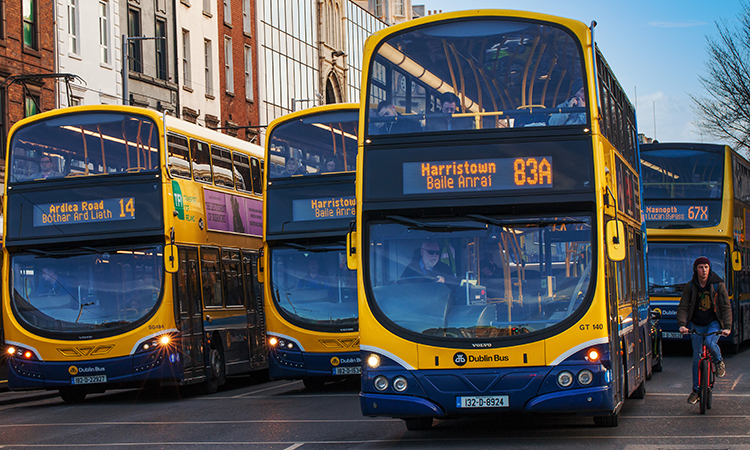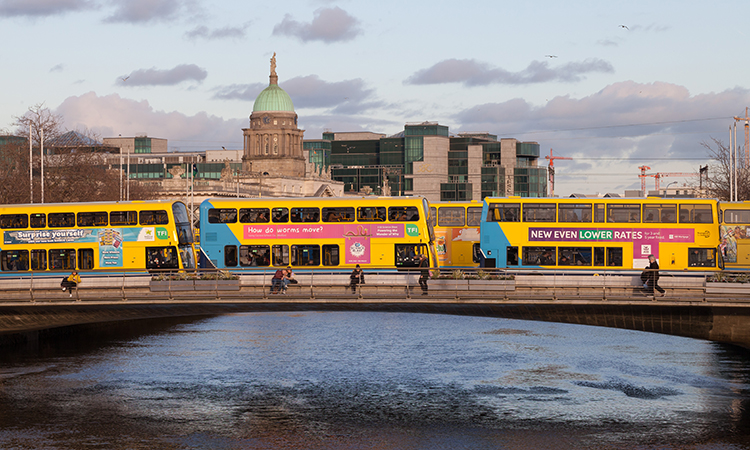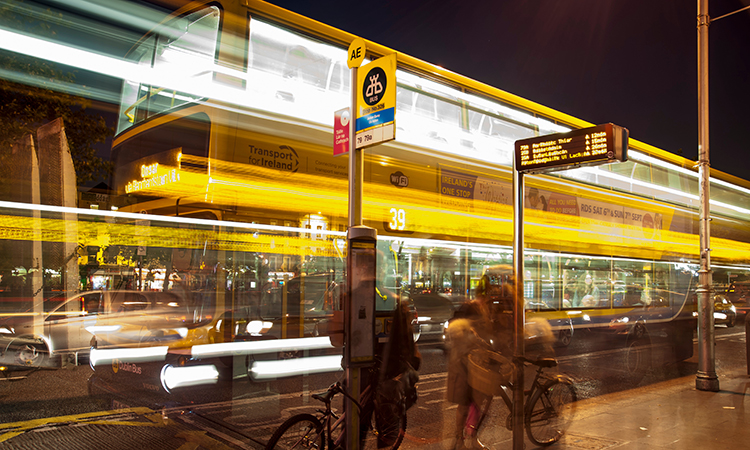Shaping the future of transport in Dublin
- Like
- Digg
- Del
- Tumblr
- VKontakte
- Buffer
- Love This
- Odnoklassniki
- Meneame
- Blogger
- Amazon
- Yahoo Mail
- Gmail
- AOL
- Newsvine
- HackerNews
- Evernote
- MySpace
- Mail.ru
- Viadeo
- Line
- Comments
- Yummly
- SMS
- Viber
- Telegram
- Subscribe
- Skype
- Facebook Messenger
- Kakao
- LiveJournal
- Yammer
- Edgar
- Fintel
- Mix
- Instapaper
- Copy Link
Posted: 14 December 2022 | Sorin Costica - Dublin Bus | No comments yet
Sorin Costica, Head of Operations at Dublin Bus, shares his concerns and ambitions for the future of transport in Dublin and highlights the importance of embracing technology – such as MaaS and Account-Based Ticketing – to encourage wider modal shift in order to achieve a more sustainable and attractive public transport network in the capital city.


‘May you live in interesting times’, so the old proverb says, and we are indeed living in interesting times. There are a range of factors, both domestic and international, conflating to impact the transport sector in ways which I have never seen before.
All of this means that there is growing debate about the future of transport in Dublin. What will Dublin Bus be like in 20 years, when today’s children are in college, or trying to get their first job, or maybe thinking about starting a family? In 20 years, will today’s children be travelling in bus lanes where priority is time limited? Will they endure increased congestion and traffic jams that start earlier and end later? Or will they travel on zero‑emission buses, in 24-hour high priority corridors, to a city where the private car is no longer the dominant mode?
The answers depend to a great extent on the decisions that we make now about public transport and its broader eco-system.
Now is the time to prioritise
The Organisation for Economic Co-operation and Development’s (OECD) ‘Redesigning Ireland’s Transport for Net Zero’ report made for sobering reading. The report, published in early October 2022, finds that Ireland’s existing transport habits stand in the way of the country achieving its goal of reducing greenhouse gas (GHG) emissions by 51 per cent of 2018 levels by 2030, for which a 50 per cent reduction from the transport sector will be necessary.
As economic and population growth continues, congestion levels will further increase and climate targets will be missed, unless significant mitigating measures are put in place”
My main takeaway from this report is the scale of mindset and modal shift required. It means reducing our dependency on private cars. Congestion during the morning and evening peak commute is a significant problem in Dublin. Our city’s roads are not designed for large volumes of car traffic and there are many users competing for the limited road space available, including private transport, public transport, cyclists, taxis, delivery vehicles and pedestrians. As economic and population growth continues, congestion levels will further increase and climate targets will be missed, unless significant mitigating measures are put in place.
Measures should be introduced to limit or discourage private car use in urban areas. The implementation and enforcement of 24-hour bus lanes, a reduction in the availability of parking spaces for private vehicles and the introduction of some demand management measures would immediately reduce the number of private vehicles in the city centre.


The industry needs to challenge itself to come up with answers and to keep moving forward. And that’s what Dublin Bus is all about.
Demand management involves taking active steps to either restrict or apply some form of charge to private car movements. It can take the form of congestion charges, outright bans on cars for certain places, parking levies or restricting access to city corridors based on air quality or carbon emission grounds. This is not out of any desire to punish car drivers, but is instead due to the growing realisation that, without drastic action, the city will become unmanageable, and both the economy and environment will suffer.
What is certain is that any efforts to introduce this must be well-planned and those affected given alternative options. But it is time to start that conversation now and to try to build a social consensus around the right approach. We can all accept that the status quo is not working. But, as a city, we also need to take the time now to drive a consensus behind what can be, and is, workable for the city. As custodians of the capital’s public transport needs, we want Dublin and its people to thrive.
Technology can make the bus a more attractive option than car
In building consensus around alternatives to the status quo, we must make the decision to leave the car at home an easy one. A basic but fundamental question is, how do we ensure that technological developments serve our customers and contribute to Dublin’s wellbeing?
We need to challenge ourselves to come up with answers and to keep moving forward. And that’s what Dublin Bus is all about.
Over the past 30 years, Dublin Bus has consistently adopted technology like real-time passenger information (RTPI) to ensure that reliability, frequency and punctuality are core elements of the customer experience. We’ve also added free Wi-Fi and USB charging points to our customer offering. Now, we are aiming to define new standards and experiences for customers by harnessing the transformative potential of technology.


Over the past 30 years, Dublin Bus has consistently adopted technology like RTPI to ensure that reliability, frequency and punctuality are core elements of the customer experience.
In recent years, ‘innovation’ has become such a buzzword that it risks losing all meaning – and transport operators risk losing our focus as we contend with the constantly shifting and rapidly developing worlds of transport and technology. Understanding how people and businesses make decisions and interact with technology provides an opportunity to place the customer at the heart of an integrated transport system.
Understanding how people and businesses make decisions and interact with technology provides an opportunity to place the customer at the heart of an integrated transport system”
We are examining how technology can help to make our services a more compelling and attractive alternative for those who currently rely on their cars for journeys to and from work, for school runs, shopping trips and when enjoying sporting, cultural and leisure pursuits.
This means working with the National Transport Authority (NTA) on initiatives like Account-Based Ticketing, which the Irish government has agreed to fund to progress under the Next Generation Ticketing phase of BusConnects. Account-Based Ticketing can provide faster boarding times, allows for dynamic pricing to manage demand, provides a single payment system for the whole transport system and can provide the cheapest fare given the journeys and modes taken, in real-time. In addition, it can significantly simplify and enhance the customer experience, and also provide significant insights through data that can further benefit Dublin Bus customers.
Account-Based Ticketing is also part of an eco‑system that is emerging – Mobility-as-a-Service (MaaS). MaaS combines the services offered by all available transport providers into a single app, which allows customers to plan and pay for their personalised end-to-end multimodal journey. Taking account of bus, rail, tram, taxi, cycling and micro-mobility, it allows the user to plan the most convenient journey for them and takes away the complexity of multiple payments.
The greater the number of clean and efficient transport options available, the healthier and more sustainable Dublin will be, now and into the future”
The greater the number of clean and efficient transport options available, the healthier and more sustainable Dublin will be, now and into the future. There is a range of complementary solutions that are possible, including better provision for cyclists and users of e-bikes and e-scooters. That’s why we are actively exploring how we can supplement our core bus services with other complementary, sustainable modes of transport, in order to expand the overall customer offering. The fact that we are well placed to explore new opportunities is a recognition and validation of the quality of our services over many decades. It is also a statement about the ambitions of Dublin Bus for the future.
Embracing change is essential
“We stand today on the edge of a New Frontier” – this was the immortal line uttered by John F. Kennedy, the 35th U.S. President, in a speech that he gave in 1960. He was imploring the American people to take stock of the progress that their country had made, while at the same time urging a spirit of ambition and innovation to help them ride a new wave of prosperity.
Today, we stand on the edge of our very own new frontier. Having a public transport system that is a better option than owning a car is a vision that is achievable and will enable our city to fulfil its potential in many diverse areas. These include enhanced urban living opportunities, reduced congestion, improved air quality and reduced noise pollution. It will enable the economy to prosper and provide a platform for a vibrant social and cultural Dublin.


Related topics
Accessibility, Fleet Management & Maintenance, Infrastructure & Urban Planning, Journey Planning, Micro-mobility, Mobility Services, Multimodality, Passenger Experience, Public Transport, Ticketing & Payments, Travel & Passenger Information
Issue
Issue 4 2022
Related modes
Bikes & Scooters, Bus & Coach, Rail, Tram
Related cities
Dublin
Related countries
Ireland
Related organisations
Dublin Bus, Government of Ireland, National Transport Authority (NTA), Organisation for Economic Co-operation and Development (OECD)
Related people
Sorin Costica








